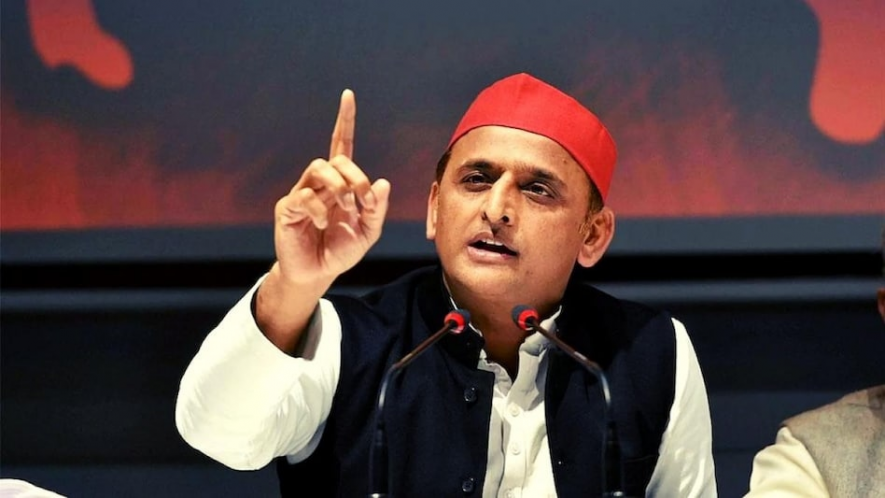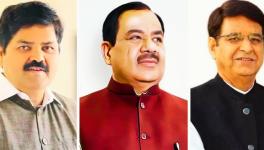‘Is Baar PDA Sarkar’ Samajwadi Party’s 2024 Battle cry

Lucknow: The Samajwadi Party (SP) is riding high on the resounding victory in the Ghosi Assembly by-poll and the successful implementation of its ‘PDA’—Pichhde (backward classes), Dalit (oppressed) and ‘Alpsankhyak (minorities)—plank pushed hard during the campaign.
A section of party leaders wants to take measures to bolster its organisational structure in the state. SP president and former chief minister Akhilesh Yadav believes that this approach will be a robust counter to the BJP in Uttar Pradesh in the 2024 general election in Uttar Pradesh, strengthen the party and ensure its achievements reach people and translate into votes.
After the by-poll result, Yadav said, “Ghosi has not only made the SP candidate win but it also is the victory of the INDIA coalition candidate. This will be the outcome of the approaching tomorrow (2024).”
According to SP national spokesperson and former minister Rajendra Chaudhary, the strategy of the party and its allies to become the voice of the backward, Dalits and minorities was successful in Ghosi.
The Samajwadi party has already started branding future elections with the catchline “Is Baar PDA Sarkar” (PDA government this time), printed in bold on a poster carrying a photograph of Yadav thanking Ghosi’s voters for their support to SP and its candidate Sudhakar Singh.
With indications that Dalits largely voted for the SP in the BSP’s absence, the party is contemplating a more focused outreach programme for the ‘Bahujan Samaj’.
Political observers, however, feel that the Ghosi result is unlikely to become a template for SP’s victory in elections. Despite SP’s campaigning having a major impact on voters, the party may not be able to ensure equally exhaustive campaigning and sustained and focused involvement of senior leaders when Lok Sabha and Assembly elections are held as there are several constituencies in every phase.
BSP not only stayed away from the by-poll but a few days before the polling, state party chief Vishwanath Pal appealed to the party cadre to stay away from the election, making it one-on-one between the SP and BJP.
Another noticeable point was the BSP’s decreasing vote share in the by-poll. The BJP’s vote share increased from 33% in 2022 to 37.54% in 2023 while the SP’s vote share increased from 42.21% to 57.19%. The BSP polled 21.12% of the total votes in Ghosi in 2022. Clearly, a chunk of it has gone to the SP against the popular assumption that it could have shifted to the BJP.
Of the nearly 4.38 lakh voters in Ghosi, 90,000 are Muslims, 60,000 Dalits and 77,000 from “upper castes”—45,000 Bhumihars, 16,000 Rajputs and 6,000 Brahmins, according to estimates.
Congress leaders also believe that a political strategy will have to be made keeping in mind backward Dalits and minorities.
“The victory of the INDIA coalition’s candidate shows that people are distressed with the BJP’s anti-people policies and hate politics. It’s decided! In 2024, the people of Uttar Pradesh have decided to bid farewell to NDA,” Congress leader PL Punia told Newsclick.
Echoing a similar view, CPI national secretary Atul Kumar Anjaan said that the INDIA’s “great leap in the Ghosi Assembly be-election will pave the road for grabbing an overwhelming number of UP’s 80 parliamentary seats”.
However, SP leader Sanjeev Rai feels the INDIA bloc “has a long way to go”. “There still exists a big gap in the vote shares of the BJP and INDIA. The bloc can’t be complacent based on recent victories in UP and some other states,” he told Newsclick.
In the 2022 Assembly election, the SP secured 32.1% votes
against the BJP’s 41.29%. The Congress secured barely 2.33% votes, insignificant in a populous state like UP. However, the SP’s vote share went up sharply compared to the 2017 elections, when the Yadav-led party secured only 21.8% votes and was reduced to 47 seats. The SP’s seats also went up to 111 in 2022.
On the other hand, the BJP’s vote share remained almost the same in 2017 and 2022, but its seats in the Assembly were reduced substantially. In the 2022 Assembly election, the BJP won 255 seats against 312 in 2017. Thus, the combined vote shares of the Congress and SP would not have made any difference against the BJP in 2022.
Get the latest reports & analysis with people's perspective on Protests, movements & deep analytical videos, discussions of the current affairs in your Telegram app. Subscribe to NewsClick's Telegram channel & get Real-Time updates on stories, as they get published on our website.
























